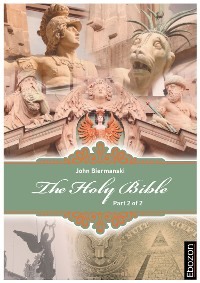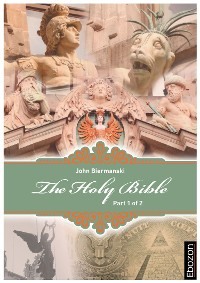
Полная версия
The Sacred Scriptures - 29th Special Edition (Part 4/4)
Such was the position of affairs, when, in 533, Justinian entered upon his Vandal and Gothic wars. Wishing to secure the influence of the pope and the Catholic party, he issued that memorable decree which was to constitute the pope the head of all the churches, and from the carrying out of which, in 538, the period of papal supremacy is to be dated. And whoever will read the history of the African campaign, 533-534, and the Italian campaign, 534-538, will notice that the Catholics everywhere hailed as deliverers the army of Belisarius, the general of Justinian.
The testimony of D'Aubigne (Reformation, book 1, chap. 1) also throws light upon the undercurrents which gave shape to outward movements in these eventful times. He says: "Princes whom these stormy times often shook upon their thrones, offered their protection if Rome would in its turn support them. They conceded to her the spiritual authority, provided she would make a return in secular power. They were lavish of the souls of men, in the hope that she would aid them against their enemies. The power of the hierarchy, which was ascending, and the imperial power, which was declining, leaned thus one upon the other, and by this alliance accelerated their twofold destiny. Rome could not lose by it. An edict of Theodosius II and of Valerian III proclaimed the Roman Bishop 'rector of the whole church.' Justinian published a similar decree."
But no decree of this nature could be carried into effect until the Arian horns which stood in its way were overthrown. The Vandals fell before the victorious arms of Belisarius in 534; and the Goths received a crushing blow in connection with their unsuccessful siege of Rome in 538. (Gibbon, chap. 41.)
Procopius relates that the African war was undertaken by Justinian for the relief of the Christians (Catholics) in that quarter; and that when he expressed his intention in this respect, the prefect of the palace came very near dissuading him from his purpose; but a dream appeared to him in which he was bidden "not to shrink from the execution of his design; for by assisting the Christians he would overthrow the power of the Vandals." - Evagrius' Eccl.Hist., book 4, chap. 16.
Listen again to Mosheim: "It is true that the Greeks who had received the decrees of the Council of Nicaea [that is, the Catholics], persecuted and oppressed the Arians wherever their influence and authority could reach; but the Nicenians, in their turn, were not less rigorously treated by their adversaries [the Arians], particularly in Africa and Italy, where they felt, in a very severe manner, the weight of the Arian power, and the bitterness of hostile resentment. The triumphs of Arianism were, however, transitory, and its prosperous days were entirely eclipsed when the Vandals were driven out of Africa, and the Goths out of Italy, by the arms of Justinian." - Mosheim's Church History, cent. 6, part 2, chap. 5, sec. 3.
Elliot, in his Horae Apocalypticae, makes two enumerations of the ten kingdoms which rose out of the Roman empire, varying the second list from the first according to the changes which had taken place at the later period to which the second list applies. His first list differs from that mentioned in remarks on chap.2:42, only in that he put the Alemanni in place of the Huns, and the Bavarians in place of the Lombards, a variation which can be easily accounted for. But out of this list he names the three that were plucked up before the papacy in these words: "I might cite three that were eradicated from before the pope out of the list first given; namely, the Heruli under Odoacer, the Vandals, and the Ostrogoths." - Vol. III, p. 152, note 1.
Although he prefers the second list, in which he puts the Lombards instead of the Heruli, the foregoing is good testimony that if we make the enumeration of the ten kingdoms while the Heruli were a ruling power, they were one of the horns which were plucked up.
From the historical testimony above cited, we think it clearly established that the three horns plucked up were the powers named; viz., the Heruli in A.D. 493, the Vandals in 534, and the Ostrogoths in 538. The effective opposition of the Ostrogoths to the decree of Justinian, however, it is to be noted, ceased when they were driven from Rome by Belisarius in 538.
After pointing out to us the place occupied by this beast as a world power, and giving the number of the nations which he should annihilate because they oppose him (verses 23, 24), Daniel next describes the attitude of this beast toward God and His saints.
1. "He shall speak great words against the Most High." Has the papacy done this? Here are a few of the Pope's self-accepted titles: "Vicegerent of the Son of God," "Our Lord God, the Pope," "Annother God upon earth," "King of the world," "King of kings and Lord of lords." - (See gloss on the Extravagantes of Pope John XXII, title 14, ch. 4, "Declaramus.") - Said Pope Nicholas to Emperor Michael, "The pope, who is called God by Constantine, can never be bound or released by man; for God cannot be judged by man." - (Decreti Prima Pars. Distinctio XCVI, Caput 8). Is there need of bolder blasphemy than this? Listen also the adulation the popes have received from their followers without rebuke. A Venetian prelate in the fourth session of the Lateran, addressed the Pope as follows: "Thou art our Shepherd, our Physician, in short, a second God upon earth." Another bishop called him "the lion of the tribe of Judah, the promised Saviour." Lord Anthony Pucci, in the fifth Lateran, said to the pope, "The sight of thy divine majesty does not a little terrify me; for I am not ignorant that all power both in heaven and in earth is given unto you; that the prophetic saying is fulfilled in you, 'All the kings of the earth shall worship him, and nations shall serve him.'" (See Oswald's Kingdom Which Shall Not Be Destroyed, pp.97-99.)
Again, Dr. Clarke, on verse 25, says: "'He shall speak as if he were God.' So St. Jerome quotes from Symmachus. To none can this apply so well or so fully as to the popes of Rome. They have assumed infallibility, which belongs only to God. They profess to forgive sins, which belongs only to God. They profess to open and shut heaven, which belongs only to God. They profess to be higher than all the kings of the earth, which belongs only to God. And they go beyond God in pretending to loose whole nations from their oath of allegiance to their kings, when such kings do not please them. And they go against God when they give indulgences for sin. This is the worst of all blasphemies."
2. "And shall wear out the saints of the Most High." Has the papacy done this? For the mere information of any student of church history, no answer need here be given. All know that for long years the papal church has pursued its relentless work against the true followers of God. Chapter after chapter might be given, would our limited space permit. Wars, crusades, massacres, inquisitions, and persecutions of all kinds, - these were their weapons of extinction.
Scott's Church History says: "No computation can reach the numbers who have been put to death, in different ways, on account of their maintaining the profession of the gospel, and opposing the corruptions of the Church of Rome. A million of poor Waldenses perished in France; nine hundred thousand orthodox Christians were slain in less than thirty years after the institution of the order of the Jesuits. The Duke of Alva boasted of having put to death in the Netherlands thirty-six thousand by the hand of the common executioner during the space of a few years. The Inquisition destroyed, by various tortures, one hundred and fifty thousand within thirty years. These are a few specimens, and but a few, of those which history has recorded. But the total amount will never be known till the earth shall disclose her blood, and no more cover her slain."
Commenting on the prophecy that the little horn should "wear out the saints of the Most High," Barnes, in his Notes on Dan.7:25, says: "Can any one doubt that this is true of the papacy? The Inquisition, the persecutions of the Waldenses, the ravages of the Duke of Alva, the fires of Smithfield, the tortures of Goa, - indeed, the whole history of the papacy, may be appealed to in proof that this is applicable to that power. If anything could have worn out the saints of the Most High, - could have cut them off from the earth so that evangelical religion would have become extinct, - it would have been the persecutions of the papal power. In year 1208 a crusade was proclaimed by Pope Innocent III against the Waldenses and Albigenses, in which a million men perished. From the beginning of the order of Jesuits in the year 1540 to 1580, nine hundred thousand were destroyed. One hundred and fifty thousand perished by the Inquisition in thirty years. In the Low Countries fifty thousand persons were hanged, beheaded, burned, or buried alive, for the crime of heresy, within the space of thirty-eight years from the edict of Charles V against the Protestants to the peace of Chateau Cambresis in 1559.
Eighteen thousand suffered by the hand of the executioner in the space of five years and a half, during the administration of the Duke of Alva. Indeed, the slightest acquaintance with the history of the papacy will convince any one that what is here said of 'making war with the saints' (verse 21), and 'wearing out the saints of the Most High' (verse 25), is strictly applicable to that power, and will accurately describe its history." (See Buck's Theological Dictionary, art., Persecutions: Oswald's Kingdom, etc., pp.107-133; Dowling's History of Romanism; Fox's Book of Martyrs: Charlotte Elizabeth's Martyrology; The Wars of the Huguenots; The Great Red Dragon, by Anthony Gavin, formerly one of the Roman Catholic priests of Saragossa, Spain; Histories of the Reformation, etc.)
To parry the force of this damaging testimony from all history, papists deny that the church has ever persecuted any one; it has been the secular power; the church has only passed decision upon the question of heresy, and then turned the offenders over to the civil power, to be dealt with according to the pleasure of the secular court. The impious hypocrisy of this claim is transparent enough to make it an absolute insult to common sense. In those days of persecution, what was the secular power? - Simply a tool in the hand of the church, and under its control, to do its bloody bidding. And when the church delivered its prisoners to the executioners to be destroyed, with fiendish mockery it made use of the following formula: "And we do leave thee to the secular arm, and to the power of the secular court; but at the same time do most earnestly beseech that court so to moderate its sentence as not to touch thy blood, nor to put thy life in any sort of danger." And then, as intended, the unfortunate victims of popish hate were immediately executed.
(Geddes's Tracts on Popery; View of the Court of Inquisition in Portugal, p.446; Limborch, Vol.II, p.289.)
But the false claims of papists in this respect have been flatly denied and disproved by one of their own standard writers, Cardinal Bellarmine, who was born in Tuscany in 1542, and who, after his death in 1621, came very near being placed in the calendar of saints on account of his great services in behalf of popery. This man, on one occasion, under the spur of controversy, betrayed himself into an admission of the real facts in the case. Luther having said that the church (meaning the true church) never burned heretics, Bellarmine, understanding it of the Romish Church, made answer: "This argument proves not the sentiment, but the ignorance or impudence of Luther; for as almost an infinite number were either burned or otherwise put to death, Luther either did not know it, and was therefore ignorant; or if he knew it, he was convicted of impudence and falsehood; for that heretics were often burned by the church, may be proved by adducing a few from many examples."
To show the relation of the secular power to the church, as held by Romanists, we quote the answer of the same writer to the argument that the only weapon committed to the church is "the sword of the Spirit, which is the word of God." To this he replied: "As the church has ecclesiastical and secular princes, who are her two arms, so she has two swords, the spiritual and material; and therefore when her right hand is unable to convert a heretic with the sword of the Spirit, she invokes the aid of the left hand, and coerces heretics with the material sword." In answer to the argument that the apostles never invoked the secular arm against heretics, he says, "The apostles did it not, because there was no Christian prince whom they could call on for aid [Editor: The true Spirit of Satan answered!]. But afterward, in Constantine's time, . . . the church called in the aid of the secular arm." - Dowling's History of Romanism, pp.547, 548.
In corroboration of these facts, fifty million martyrs - this is the lowest computation made by any historian - will rise up in the judgment as witnesses against that church's bloody work.
Pagan Rome persecuted relentlessly the Christian church, and it is estimated that three million Christians perished in the first three centuries, yet it is said that the primitive Christians prayed for the continuance of imperial Rome; for they knew that when this form of government should cease, another far worse persecuting power would arise, which would literally, as this prophecy declares, "wear out the saints of the Most High." Pagan Rome could slay the infants, but spare the mothers; but papal Rome slew both mothers and infants together. No age, no sex, no condition in life, was exempt from her relentless rage. "When Herod died," says a forcible writer, "he went down to the grave with infamy; and earth had one murderer, one persecutor, less, and hell one victim more. O Rome! what will not be thy hell, and that of thy votaries, when thy judgment shall have come!"
3. And shall "think to change times and laws." What laws and whose? Not the laws of other earthly governments; for it was nothing marvelous or strange for one power to change the laws of another, whenever it could bring such power under its dominion. Not human laws of any kind; for the little horn had power to change these so far as its jurisdiction extended; but the times and laws in question were such as this power should only think to change, but not be able to change. They are the laws of the same Being to whom the saints belong who are worn out by this power; namely, the laws of the Most High. And has the papacy attempted this? - Yes, even this. It has, in its catechisms, expunged the second commandment of the decalogue to make way for its adoration of images. It has divided the tenth commandment to make up the number ten. And, more audacious than all! it has taken hold of the fourth commandment, torn from its place the sabbath of Jehovah, the only memorial of the great God ever given to man, and erected in its place a rival institution to serve another purpose. [* 1 See Catholic catechims and the work entitled, "Who Changed the Sabbath?" and works on the Sabbath and Law published by the publishers by Review and Herald, Battle Creek, Michigan].
4. "And they shall be given into his hand until a time and times and the dividing of time." The pronoun they embraces the saints, the times, and the laws just mentioned. How long a time were they to be given into the hands of this power? A time, as we have seen from the chapter 4:23, is one year; two times, the least that could be denoted by the plural, two years, and the dividing of time, or half a time (Sept., ,) half a year. Gesenius also gives "...., (Chald.), a half. Dan. 7:25," We thus have three years and a half for the continuance of this power. the Hebrew, or rather the Chaldaic, word for time in the text before us, is , iddân, which Gesenius defines thus: "Time. Specially in prophetic language for a year. Dan. 7:25 for a year, also two years and half a year; i.e., for three years and a half; comp. Jos.B.J.1.1.1." We must now consider that we are in the midst of symbolic prophecy; hence in this measurement the time is not literal, but symbolic also. The inquiry then arises, How long a period is denoted by the three years and a half of prophetic time? The rule given us in the Bible is, that when a day is used as a symbol, it stands for a year. Eze.4:6; Num.14:34. Under the Hebrew word for day, (yom), Gesenius has this remark: "3. Sometimes [Yamim] marks a definite space of time; viz., a year; as also Syr. and Chald. [iddân] denotes both time and year; and as in English several words signifying time, weight, measure, are likewise used to denote certain specified times, weights, and measures."
The ordinary Jewish year, which must be used as the basis of reckoning, contained three hundred and sixty days. Three years and a half contained twelve hundred and sixty days. As each day stands for a year, we have twelve hundred and sixty years for the continuation of the supremacy of this horn. Did the papacy possess dominion that length of time/ The answer again is, Yes. The edict of the emperor Justinian, dated A.D. 533, made the bishop of Rome the head of all the churches. But this edict could not go into effect until the Arian Ostrogoths, the last of the three horns that were plucked up to make room for the papacy, were driven from Rome; and this was not accomplished, as already shown, till A.D. 538. The edict would have been of no effect had this latter event not been accomplished; hence from this latter year we are to reckon, as this was the earliest point where the saints were in reality in the hand of this power. From this point did the papacy hold supremacy for twelve hundred and sixty years? - Exactly. For 538 + 1260 = 1798; and in the year 1798, Berthier, with a French army, entered Rome, proclaimed a republic, took the pope prisoner, and for a time abolished the papacy. It has never since enjoyed the privileges and immunities which it possessed before. Thus again this power fulfils to the very letter the specifications of the prophecy, which proves beyond question that the application is correct.
After describing the terrible career of the little horn, and stating that the saints should be given into his hand for 1260 years, bringing us down to 1798, verse 26 declares: "But the judgment shall sit, and they shall take away his dominion, to consume and to destroy it unto the end." In verse 10 of the same chapter we have substantially the same expression relative to the judgment: "The judgment was set." It would seem consistent to suppose that the same judgment is referred to in both instances. But the sublime scene described in verse 10 is the opening of the investigative judgment in the sanctuary in heaven, as will appear in remarks on Dan.8:14 and 9:25-27. The opening of this judgment scene is located by the prophecy at the close of the great prophetic period of 2300 years, which terminated in 1844. (See under chapter 9:25-27.) Four years after this, in 1848, the great revolution which shook so many thrones in Europe, drove the Pope also from his dominions and his restoration shortly after was due to foreign aid. Dec. 8, 1854, the dogma of the Immaculate Conception was decreed by the pope. July 21, 1870, in the great Ecumenical Council assembled at Rome, it was deliberately decreed, by a vote of 538 against 2, that the pope was infallible. In the same year, France, by whose bayonets the pope was kept upon his throne, was crushed by Prussia, and the last prop was taken from under the papacy. Then Victor Emmanuel, seeing his opportunity to carry out the long-cherished dream of a united Italy, seized Rome to make it the capital of his kingdom. To his troops, under General Cadorna, Rome surrendered, Sept.20, 1870. The pope's temporal power was thus wholly taken away, nevermore, said Victor Emmanuel, to be restored; and since that time, the popes, shutting themselves up in the Vatican, have styled themselves "prisoners." His dominion was to be consumed unto the end, implying that when his power as a civil ruler should be wholly destroyed, the end would not be far off.
The overthrow of the papacy in 1798 marked the conclusion of the prophetic period of 1260 years, and constituted the "deadly wound" prophesied in Rev.13:3, to come upon this power; but this deadly wound was to be "healed." In 1800 another pope was elected; his palace and temporal dominion were restored, and every prerogative except, as Mr. Croly says, that of a systematic persecutor, was again under his control; and thus the wound was healed. But since 1870, he has enjoyed no prestige as a temporal prince, among the nations of the earth.
"VERSE 27. And the kingdom and dominion, and the greatness of the kingdom under the whole heaven, shall be given to the people of the saints of the Most High, whose kingdom is an everlasting kingdom, and all dominions shall serve and obey him. 28. Hitherto is the end of the matter. As for me Daniel, my cogitations much troubled me, and my countenance changed in me: but I kept the matter in my heart."
After beholding the dark and desolate picture of papal oppression upon the church, the prophet is permitted once more to turn his eyes upon the glorious period of the saints' rest, when they shall have the kingdom, free from all oppressive powers, in everlasting possession. How could the children of God keep heart in this present evil world, amid the misrule and oppression of the governments of earth, and the abominations that are done in the land, if they could not look forward to the kingdom of God and the return of their Master, with full assurance that the promises concerning them both shall certainly be fulfilled, and that speedily?
*Note. - Some startling events relative to the papacy, filling up the prophecies uttered in this chapter concerning that power, have taken place within a few years of the present time. Commencing in 1798, where the first great blow fell upon the papacy, what have been the chief characteristics of its history? Answer: The rapid defection of its natural supporters, and greater assumptions on its own part. In 1844, the judgment of verse 10 began to sit; namely, the investigative judgment, in the heavenly sanctuary, preparatory to the coming of the Messiah. Dec. 8, 1854, the dogma of the Immaculate Conception ... July 21, 1870, in the great Ecumenical Council ... the pope was infallible. ...under General Cadorna, Rome surrendered, Sept.20, 1870. The pope's temporal power was thus wholly taken away, nevermore, said Victor Emmanuel, to be restored; ... the popes, shutting themselves up in the Vatican, ... "prisoners." Because of the great words which the horn uttered, Daniel saw the beast destroyed, and given to the burning flame. This destruction is to take place at the second coming of the Messiah and by means of that event; for the man of sin is to be consumed by the spirit of the Messiah's mouth, and destroyed by the brightness of his coming. 2Thess.2:8. What words could be more arrogant, presumptuous, blasphemous, or insulting to high Heaven, than the deliberate adoption of the dogma of infallibility, thus clothing a mortal man with a prerogative of the Deity [falsification, because it is a catholic, trinitarian phrase! Right and correct is the word: divinity ]?
And this was accomplished by papal intrigue and influence, July 21, 1870. Following in swift succession, the last vestige of temporal power was wrenched from his grasp. It was because of these words, and as if in almost immediate connection with them, that the prophet saw this power given to the burning flame. His dominion was to be consumed unto the end, implying that when his power as a civil ruler should be wholly destroyed, the end would not be far off. And the prophet immediately adds: "And the kingdom and dominion, and the greatness of the kingdom under the whole heaven, shall be given to the people of the saints of the Most High." All in this line of prophecy has now been fully accomplished except the closing scene. Next comes the last, crowning act in the drama, when the beast will be given to the burning flame, and the saints of the Most High will take the kingdom. We must be, now, upon the very threshold of this glorious event.
from: "Daniel and the Revelation" by Uriah Smith, published 1897 by the Review and Herald, pp. 139-162; the Stanborough Press, pp. 131-150
Editor insert the Name of our YAHWEH Elohim (God) and of our Master Yahshua the Messiah in this work; [...]









